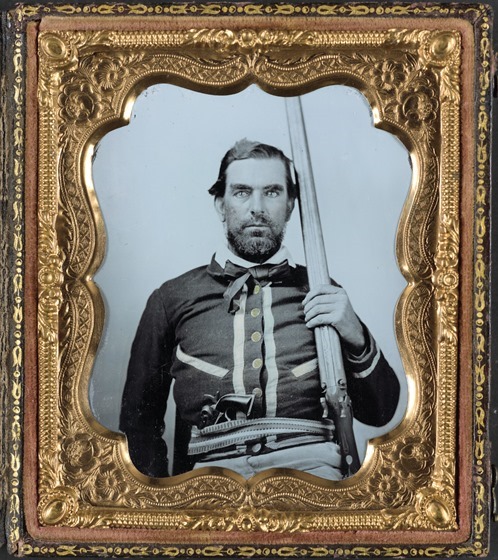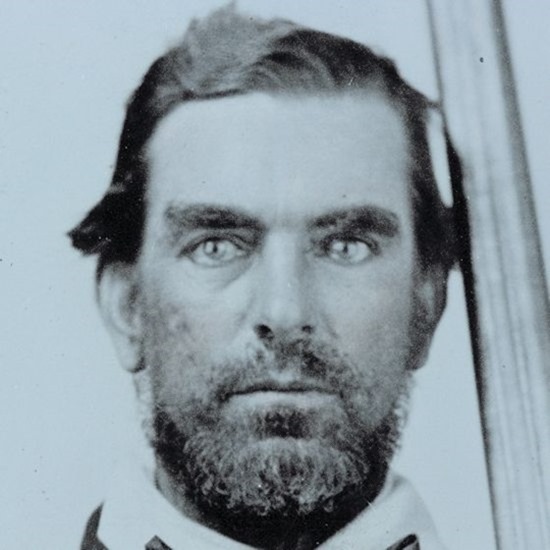January 2nd. In line all night. Not much sleep. Prisoners brought in this morning, captured by scouts, report the enemy going south, owing to the severe weather. Late this P. M. all is quiet. Our company ordered on picket for the night. A double picket line will be maintained for the night. Cold weather holds on.
Thursday, January 2, 2014
2nd. Cold, disagreeable day. Letters from home and Fannie, 1st of Jan. Both happy and sad. Made a fool of myself talking to old Brown at Hdqrs. Wrote to Fannie.
Mrs. Lyon’s Diary.
January 2, 1864.—Still very cold, six degrees below zero. The houses here are not built for warmth, but to keep cool in summer.
Saturday, 2d—I was detailed for picket again this morning, and the post I drew stationed me on the bottom land. It began to rain late in the afternoon and continued into the night and I was soon standing in water. I tell you, it is poor comfort on picket. The commanding officer banished three women from our lines today. The case against them grew out of a meeting on last Thanksgiving Day. They attended the meeting held in the Presbyterian church and when the minister prayed for the President of the United States, for the success of our arms, and for the Stars and Stripes, saying, “May they continue to float over the land of the free and the home of the brave,” the three women got up and indignantly walked out. They were banished for disloyal conduct.
2nd. Still cold as Greenland. Spent most of the day at the white house. What a splendid day to attack the enemy were our infantry on hand. Wrote letters home, to Fannie and Ella.
Larkinsville, Saturday, Jan. 2. Continued very cold and freezing. Good fires and comfortable quarters, very essential to keep warm. Captain Dillon arrived from Nashville, reports battery [of new guns] on the way. Enlistment yet the talk. I have serious thoughts upon it. I am confident that it is the best thing for us recruits. Griff, Dan and others in the same way; if one goes, all go. A dance held down town by “Alabam” gals and Yankee soldiers. Running rumor afloat that we are to leave our quarters soon for Huntsville. Don’t like it.
1864—January:
Saturday, 2d.—Very cold. Gave John Bartly $5.00 to go on guard in my place. General routine of camp life. Prayer meetings, preaching, and debates on such subjects as “Which has the greater claim, mother or wife?” Which is the greater evil, intemperance or civil war?” As to the first decision, argument was about equal; later, war won.
January 2, Saturday. Double duty for yesterday’s holiday. Senator Sumner called on Saturday as usual. After disposing of some little matters of business, he spoke of the President and the election. He says the President is moving for a reelection, and has, he knows, spoken to several persons on the subject very explicitly. I told him the President had exchanged no word with me on the subject, but that I had taken for granted he would be a candidate, that I thought all Presidents had entertained dreams of that nature, and that my impressions are that a pretty strong current is setting in his favor. To this Sumner made no response, affirmatively or negatively. I think his present thoughts are in another direction, but not very decidedly so. Neither of us cared to press the other. Whether he had in view to sound me I was uncertain, and am still.
In many very essential respects Sumner is deficient as a party leader, though he has talents, acquirements, sincerity, and patriotism, with much true and false philanthropy. He is theoretical rather than practical. Is egotistical, credulous to weakness with those who are his friends; is susceptible to flattery from any quarter, and has not the suspicions and jealousies that are too common with men in position. There is want of breadth, enlarged comprehension, in his statesmanship. He is not a Constitutionalist, has no organizing and constructive powers, and treats the great fundamental principles of the organic law much as he would the resolutions of the last national party convention. Towards the slaveholders he is implacable, and is ready to go to extremes to break up not only the system of bondage, but the political, industrial, and social system in all the rebellious States. His theorizing propensities and the resentments that follow from deep personal injuries work together in his warfare against that domineering oligarchy which has inflicted great calamities on our country and wrongs on himself. He would not only free the slaves but elevate them above their former masters, yet, with all his studied philanthropy and love for the negroes in the abstract, is unwilling to fellowship with them, though he thinks he is. It is, however, ideal, book philanthropy.
As Chairman of the Committee on Foreign Relations, his services at this time are invaluable. He is, fortunately, in many respects the opposite of Seward, has higher culture and, on international law and the science of government, is vastly better informed and greatly the superior of the Secretary of State. But the latter has greater tact, more practicality, and better knowledge of parties and men, greater versatility of genius and unsurpassed pliability, so that he can more readily adapt himself to whatever may seem expedient. Sumner acts not always from fixed principles but earnest though prejudiced convictions, investigating questions in which he is interested elaborately, and brings learning and authorities to his support. Seward is earnest for his party, but has no great deference for political principles of any kind; his convictions or opinions are weak and change without hesitation if deemed expedient or if his party can be benefited. To such a Secretary an adviser like Sumner is valuable, yet Seward does not appreciate it. There is mutual want of confidence.
My impressions are that Sumner’s present leanings are, after vague and indefinite dreams of himself, for Chase, who has ultra notions, but Chase has to some extent modified his opinions since our conversation last summer, when we took a long evening’s ride. The subject of reconstruction was just then beginning to be earnestly discussed.
Sumner has not the arts that are the chief stock in trade, to use a mercantile phrase, of some tolerably successful politicians, and he is so credulous as to be often the victim of cunning fellows of greatly inferior capacity who flatter and use him. When Senator Dixon of Connecticut desired, and was intriguing for, a reelection to the Senate, he contrived to get a quasi indorsement from Sumner in a general letter, which was used effectually to defeat Sumner’s best friends in Connecticut and injure the cause nearest his heart. Dixon understood his weakness and made skillful application of it to dupe and deceive Sumner. Too late Sumner regrets his error, but will repeat it when a shrewd and cunning mind shall need to practice the deception. He can, right or wrong, stand firm and immovable on great questions, but is swayed by little social appeals to his kindness. His knowledge of men is imperfect and unreliable, and hence, while he will always have position with his party and influence its movements he will never be the trusted leader.
Unidentified soldier in Confederate quantrillian battleshirt with double barrel percussion shotgun and cocked Colt Navy revolver.
__________
Close-up crop:
__________
sixth-plate ambrotype; 9.0 x 8.0 cm (case)
Liljenquist Family Collection of Civil War Photographs; Ambrotype/Tintype photograph filing series; Library of Congress Prints and Photographs Division.
Record page for image is here.
__________
 Note – This image has been digitally adjusted for one or more of the following:
Note – This image has been digitally adjusted for one or more of the following:
- fade correction,
- color, contrast, and/or saturation enhancement
- selected spot and/or scratch removal
- cropped for composition and/or to accentuate subject matter
- straighten image
Civil War Portrait 112
by John Beauchamp Jones
JANUARY 2D.—Gen. Longstreet writes that it will be well to winter in East Tennessee (Rogersville), unless there should be a pressing necessity for him elsewhere. But his corps ought to be at least 20,000. He says provisions may be got in that section; and if they be collected, the enemy may be forced to leave.
The Secretary of the Navy has requested the Secretary of War to open the obstructions at Drewry’s Bluff, so that the iron-clads, Richmond and Fredericksburg, may pass out. This he deems necessary for the defense of Richmond, as our iron-clads may prevent the enemy from coming up the river and landing near the city.
The Lynchburg Virginian has come out for a dictator, and names Gen. Lee.
The Raleigh (N. C.) Progress says we must have peace on any terms, or starvation. I think we can put some 200,000 additional men in the field next year, and they can be fed also.











